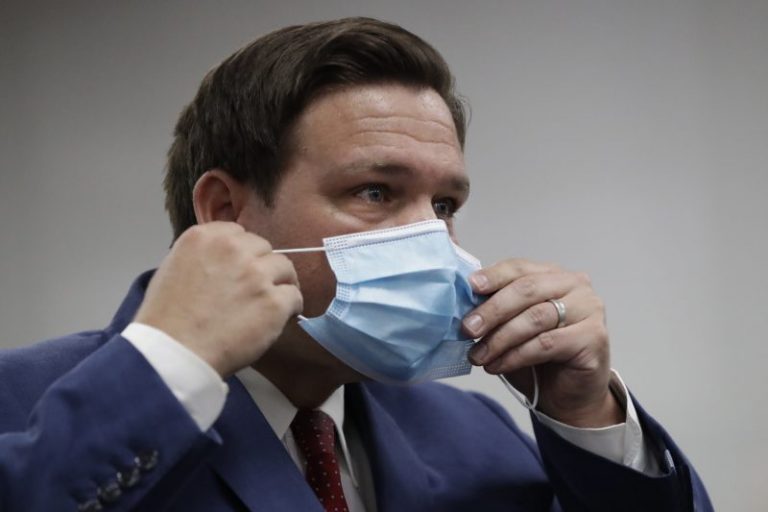Tuesday’s event in Florida was billed as a coronavirus “vaccine accountability” roundtable. Starring Gov. Ron DeSantis (R), the event included a number of health officials and academics, as well as Joseph Ladapo, the state’s surgeon general.
It soon became clear what the central component of the “accountability” would be. DeSantis announced that he would ask the state to “empanel a statewide grand jury to investigate any and all wrongdoing in Florida with respect to covid-19 vaccines.” His aim, he said, was to “bring legal accountability for those who committed misconduct” — in other words, to leverage the power of the state against bad actors.
Or, if you will, to once again leverage the power of the state to suggest that there are bad actors against whom DeSantis can be seen as taking action.
The country has by now seen more than 657 million doses of coronavirus vaccines administered, with a new study suggesting that the vaccine might have prevented more than 18 million hospitalizations and saved more than 3 million lives. Analysis from the Kaiser Family Foundation estimated that more than 230,000 lives might have been saved from June 2021 to March 2022 had covid-19 patients been vaccinated. Rates of death from covid-19 have consistently been far higher among the unvaccinated.
Meanwhile, there’s no evidence that the vaccines have led to widespread medical issues, much less death. States with lower vaccination rates had higher rates of excess death (that is, numbers of deaths exceeding expected baselines) than did states with high vaccination rates — belying the idea that the vaccine is somehow more dangerous than covid-19 — or dangerous at all.
But few people have been more direct about intertwining covid-19 response with partisan politics than DeSantis. Donald Trump’s insistence that the virus was no big deal as he sought reelection, and his efforts to cast government officials as something between worrywarts and nefarious, carried over into the vaccine development program that Trump hoped would be his legacy. DeSantis ran with that, first insisting that Florida would not implement efforts to contain the virus (positioning this as a rebellious stand against federal officials) and, eventually, helping spread doubt about the safety or utility of vaccines.
Research released earlier this year found a significant cost from this intertwining of politics and vaccines. In Florida and Ohio, there were more excess deaths among Republicans than Democrats after vaccines targeting covid-19 had been rolled out. The lower the rate of vaccination in a county, the wider the gulf in excess deaths between Republicans and Democrats.
Last September, DeSantis formalized his embrace of vaccine skepticism by appointing Ladapo to serve as surgeon general. (He was confirmed to the position in February.) Ladapo quickly established himself as an ally in DeSantis’s effort to cast preventive measures as unnecessary or unduly burdensome. In October, shortly after the research demonstrating the partisan toll of vaccine denialism was published, Ladapo issued a broadly-criticized warning about vaccine safety. He then appeared on podcasts hosted by conspiracy theorists to defend his position.
When vaccines first became widely available, Florida’s vaccination rates were consistently above those of the country overall. There’s some speculation that the state’s initial vaccine numbers were boosted by wintertime visitors from the northeast, and it’s clearly the case that the arrival of the delta variant in summer 2021 pushed vaccination rates in Florida higher. Since then, though, in the era after DeSantis tapped Ladapo as surgeon general, Florida’s lead has vanished as the state has trailed in booster adoption, including the new bivalent iteration of the vaccine.
The DeSantis administration’s filing in support of its request for a grand jury centers heavily on suggestions that the vaccines would halt transmission of the coronavirus, claims the document suggest were driven by pharmaceutical companies looking at increasing profits. It tasks the Florida Department of Law Enforcement with conducting the investigation into the purported wrongdoing, wherever it might exist.
You might recall another investigation DeSantis asked the Florida Department of Law Enforcement to undertake: one centered on purported voter fraud in the state. Back in November 2021, DeSantis announced that he was creating a new law enforcement group aimed at uprooting fraud — an idea almost certainly driven not by concern about widespread fraud in the state but, instead, on a desire to tap into the still-bubbling sense among Republican voters that fraud had cost Trump his 2020 reelection bid.
In August, DeSantis eagerly announced that his vote-fraud squad had obtained 20 indictments against people for voting illegally (in a state where nearly 11 million people voted in 2020). It later became clear that the arrests made by the enforcement team centered on former felons who’d registered to vote — at times with the help of government officials — after Florida voters passed an initiative in 2018 granting the franchise to some with felony records. Video footage showed both the arrestees and police officers seemingly baffled about the violations. Two of those arrested have since had charges dropped.
The value to DeSantis, of course, was in the announcement. Here, at last, was a Republican leader (one with clear designs on the 2024 presidential contest) willing to tackle the insidious problem of voter fraud! That the “fraud” unearthed involved people mistakenly voting rather than insidiously doing so was no matter. The results of the investigation were less important than the existence of the investigation.
Perhaps the vaccine grand jury will uncover some grand conspiracy to scare people into getting unnecessary vaccines. Or perhaps concern about the pandemic response that DeSantis himself helped stoke built political demand for treating vaccine rollouts as potentially criminal activity. Perhaps, once again, the win here is today’s news — is the eventual 2024 campaign ad in which DeSantis touts his having launched the first probe of coronavirus vaccine suppliers.
In the meantime, health officials in other states and at the federal level would remind Floridians that coronavirus vaccines remain a proven means of preventing severe illness or death from covid-19.

